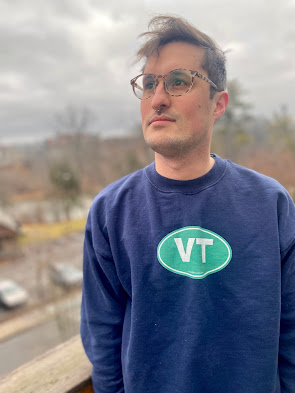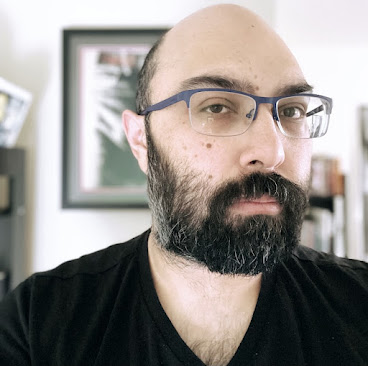rob sent me the prompt for this and I said “You want a
thousand-word love letter for Johannes Göransson? Because you’re asking for a
thousand-word love letter for Johannes Göransson.”
I’m a brown kid, raised in a Hindu household, who grew up in
uber-Baptist metro Atlanta. I was the kid with the funny name, the dark skin,
and the millions of gods. To say I was an outsider would be utterly
insufficient. To say I was a poet already would be the most accurate.
But I didn’t know that yet. I wanted to go to law school
when I was in high school— we all did in the 90s. I had an internship the
summer I turned 17 at the legal newspaper in Atlanta (while all the wealthy
white kids from the summer economics program went off to internships at giant
law firms). I majored in history at the University of Georgia (which I had been
really good at through high school) and had a plan.
Except I had no idea who I was. I had spent most of my life
trying to fit in, trying to emulate back, as best as possible, what I was
seeing around me. I hadn’t had a chance, I think, to develop a self of any
kind. I know we’re not supposed to talk about it anymore, but the only way I
can describe it is the film Zelig, in which the main character (played
by the director and writer of the film) is effectively a chameleon, able to
take on the physical characteristics of those around him in an attempt to fit
in. Even still, if I can get a laugh out of you, I feel like I’m at least justifying
being in your space, on your planet. When I was six, the neighbor lady asked if
I wanted to play softball in her church’s league— my Dad said if they asked me
to pray, to just do it because nothing bad would happen to me: it was more
important that they didn’t think I was different than them. The joys of being
raised in a religion that thinks every other religion is just a sect under its
umbrella—
Somehow— I don’t know how— I was writing poems as a
teenager, keeping them hidden away lest anyone found anything and decided I was
trouble. You learn to shut up about yourself, learn to bury the things that
make you different. You do everything you can to make sure that when people
look at you, they don’t see anything beyond what you cannot control.
I took up songwriting as a way to make poem-writing seem
more…real? Adult me would call that a capitalistic move, taking the valueless
(poems) and attempting to add some commercially viable value to it. Of course,
I still do that now for fun, as a hobby. Why ruin something that exists purely
as joy?
But I got to the University of Georgia in the fall of 2001,
weeks before 9/11, and the world changed, and college changed, and I found
myself as the worst history student ever. Memorizing facts I was good at. Writing
history papers? Not so much. I quickly gravitated towards the English
department and, better than that, towards the weird drama folks who were
hosting a one act play night. I lied: I said I had directed plays before— so
they accepted my strange script (a total rip off of the director not mentioned
at all above) and kindly the actors I cast propped me up.
Stage quickly became film and I found a professor who I
absolutely loved at UGA— the late Charles Eidsvik. I don’t know if he liked me
or found me annoying, but he was very kind to me. And we started talking
about…film school. I took his directing class and made two terrible little
films, but he said they showed promise. We talked about all sorts of things in
long office hours meetings. We’d chat when I’d drop off film equipment at 3am. Maybe
this should be a brief essay about him instead.
But I couldn’t write, he said. I had a great eye (I’m
presently bleeding into them, I’ll note), I had great editing skills and could
talk to actors, but my writing was stilted— dull. Go take a creative writing
class, he said. Come back when you’re done, he said.
But I never came back.
In mid-January 2004, I was sitting in Park Hall at the end
of a bunch of tables together. To my right was a set of windows and to my left
was a chalkboard. On the side by the windows was a guy who seemed older,
wearing a white t-shirt and listening to was maybe the first iPod I had really
seen up close. We were all gathering, waiting for the instructor.
The person in the headphones removed them, packed up the
iPod and introduced himself to the class. He had an accent I couldn’t place and
seemed very serious about writing. I was immediately obsessed with him, and
poem writing, and I can say that nearly twenty years in that none of that has
faded at all. I didn’t know, until that class with Johannes, that being a
modern poem writer, living in the world, was a thing.
What he saw or sees in me, I have no idea. Maybe it’s the
true believerism I wear on my sleeve— maybe it’s our mutual love of The
Simpsons or Godard’s Pierrot le Fou. I want to pretend that it’s
talent or that I’m fun to be around, but I’m not yet able to make that leap.
In March of 2023, I got to do something fun: Aditi Machado
told me that while I was already going to be in Cincinnati, Johannes would be
coming out to do a reading and a talk at the university. I told her not to say
something— a few years before, I had remembered my wife, Jenn (who I have been
with a few months less than I have known Johannes) getting Johannes to stop
mid-reading, surprised to see her there. “Hey Jenn!” I thought it would be
funny to show up.
So this Thursday afternoon, I slipped into the room— a
disheveled, half-vacation look— and pretty quickly, I saw Johannes’s face as he
wondered what in heckfire I was doing there. I quickly explained (Jenn had a
conference, we’re on spring break, etc.) and he went on to give yet another
wonderful reading. It felt like being 20 again— drawn in by his ever-developing
relationship to language, his strange charm mixed with a slight disdain for how
established he has become.
I remembered thinking how, even if he would never quite
understand it, Johannes saved me in a lot of ways. Okay, I’d probably own way
more useless shit, but I wouldn’t have the people in my life that the poetry
world introduced me to, including my closest friends. I wouldn’t have this
community of artists and writers that a cold Athens morning could only give me
a glimmer of.
In the nearly twenty years since, I’ve had the joy of seeing
Johannes time and time again, and thinking on it now, there have been a few
events with people who became more official mentors going forward. One night in
Providence, Johannes came to read and we had dinner with Forrest Gander, then
my MFA advisor, and like Johannes, someone who brings great joy to me whenever
I see him. A few years after that (the night he stopped reading at spotting
Jenn) my soon-to-be Ph.D. advisor, Christopher Breu, sat on the floor in front
of Johannes as they chatted. It’s weird how you can kind of feel a thread
through all of them, or to mix metaphors, a torch-passing. Forrest and Chris
should surely have their own short essays— I’m just lucky, I guess.
Even now— forty, an adult with a gig because of what started
in that English 3800 class, a few books, people I love— I come back to the well
because there has always been water in it. I often think to myself I shouldn’t
bother Johannes— that he’s had thousands of students by now (many way more
talented and easier to get along with, no doubt), he has his own family, a
grown up job, a career, a garden, a mortgage surely— but somehow he always
makes time, always has one more kind word, one more offer to help.
I hadn’t belonged anywhere as a kid— not where I grew up,
not where my parents are from (you’re always the American cousin). I had
started to find it among friends already at UGA by then, but it was poetry
world where somehow I have always felt like I belonged, even when being an
outsider. For its constant ups and downs and terrors, that has been where I
have belonged since that time in 2004. He brought me into a world there at UGA
even— we had great readers— I saw Rae Armantrout and Alice Notley and Jerome
Rothenberg and Andrew Zawacki. G.C. Waldrep has read every manuscript I’ve ever
written and Graham Foust and I occasionally throw a note about Joseph Ceravolo
back and forth. Joyelle McSweeney, who went from being Johannes’ girlfriend to
spouse I feel like during that semester, was at the first reading I ever did.
Somewhere in there, I found a self.
I could go on, no doubt— but Johannes, when he sat me down
as I applied for MFA programs in the Fall of 2004, warned me about teaching and
how it takes up much time. I didn’t listen, so I have to get back to work now.
A 1600+ word love letter. Whatever.
Amish Trivedi is a poet with three books, most
recently FuturePanic (Co•Im•Press). He has poems in American Poetry
Review, Bennington Review, Kenyon, Typo and others. He
is a postdoctoral research at the University of Delaware.






